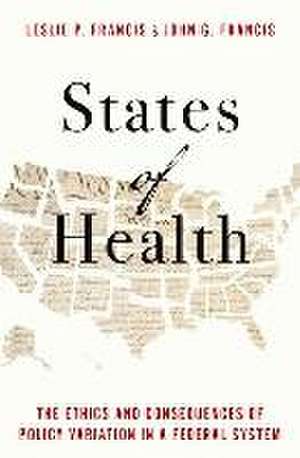States of Health: The Ethics and Consequences of Policy Variation in a Federal System
Autor Leslie P. Francis, John G. Francisen Limba Engleză Hardback – 29 aug 2024
Preț: 181.62 lei
Preț vechi: 204.50 lei
-11% Nou
Puncte Express: 272
Preț estimativ în valută:
34.76€ • 37.74$ • 29.20£
34.76€ • 37.74$ • 29.20£
Carte disponibilă
Livrare economică 21-27 martie
Preluare comenzi: 021 569.72.76
Specificații
ISBN-13: 9780197538654
ISBN-10: 0197538657
Pagini: 496
Dimensiuni: 165 x 244 x 46 mm
Greutate: 0.82 kg
Editura: Oxford University Press
Colecția OUP USA
Locul publicării:New York, United States
ISBN-10: 0197538657
Pagini: 496
Dimensiuni: 165 x 244 x 46 mm
Greutate: 0.82 kg
Editura: Oxford University Press
Colecția OUP USA
Locul publicării:New York, United States
Recenzii
In 1932 U.S. Supreme Court Justice Louis D. Brandeis famously compared individual states to laboratories trying 'novel social and economic experiments without risk to the rest of the country.' States of Health comprehensively examines the ways in which federalism in health care sometimes makes both our physical health and democracy sicker. From the spread of pandemics to travel for abortion, this book is a must-read for anyone who wants to understand what ails U.S. health care and how to fix it.
This remarkable volume explores the operation of federalism in the United States and its effect on bioethics and healthcare. It includes meticulous historical context and examination of the strengths and weaknesses of our system of divided government. The authors argue that American federalism has both led to useful outcomes for many health-related challenges and impeded integrated national responses to exigent failures in equity, inequality, and public health for all citizens. From the impact of evolving technology to consideration of current moral and cultural debates about end-of-life decisions, reproductive justice, gender identity, healthcare, and abortion, profound questions are deftly articulated and explored.
This remarkable volume explores the operation of federalism in the United States and its effect on bioethics and healthcare. It includes meticulous historical context and examination of the strengths and weaknesses of our system of divided government. The authors argue that American federalism has both led to useful outcomes for many health-related challenges and impeded integrated national responses to exigent failures in equity, inequality, and public health for all citizens. From the impact of evolving technology to consideration of current moral and cultural debates about end-of-life decisions, reproductive justice, gender identity, healthcare, and abortion, profound questions are deftly articulated and explored.
Notă biografică
Leslie P. Francis is distinguished Alfred C. Emery professor of law, distinguished professor of philosophy, and director of the Center for Law & Biomedical Sciences at the University of Utah. She has been president of the Pacific Division of the American Philosophical Association; co-chair of the Privacy, Confidentiality, and Security committee of the National Committee on Vital and Health Statistics; and a member of the Ethics Committee of the American Society for Reproductive Ethics. John G. Francis is professor emeritus of political science at the University of Utah. He publishes in the areas of comparative public policy and electoral politics, regulation, federalism, industrial policy, British electoral choice, and expanding voting access. His comparative work on American and European politics spans topics from environmental policy to health policies such as the trade in organs, HIV testing and vaccinations for athletes.
